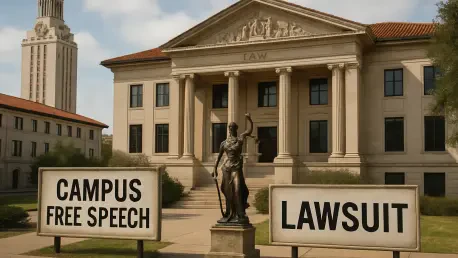As we navigate the complex landscape of free speech on college campuses, few issues have sparked as much debate as a new Texas law limiting protests and expressive activities at public universities. To unpack this controversial legislation, we’re joined by Camille Faivre, a renowned expert in education management with a focus on institutional policies in the post-pandemic era. With her deep understanding of how laws and policies shape campus environments, Camille offers invaluable insights into the intersection of education, free expression, and legal constraints. In this interview, we explore the specifics of the Texas law, the motivations behind it, the response from student groups, the constitutional challenges it faces, and the broader implications for students’ rights.
Can you walk us through the key provisions of the new Texas law regarding campus protests and expressive activities?
Certainly. This law, enacted for public colleges in Texas, imposes strict limitations on what it defines as expressive activities—essentially any speech or conduct protected under the First Amendment. One of the most striking rules is a complete ban on such activities between 10 p.m. and 8 a.m. every day. Additionally, during the last two weeks of any academic term, students are prohibited from inviting speakers to campus, using devices to amplify speech, or even playing drums or other percussive instruments. While there’s an exemption for commercial speech—think hosting a bake sale—there’s no leeway for most other forms of expression during those restricted hours, which has raised significant concerns.
What’s the stated purpose behind this legislation, according to its author?
The author of the bill, a Texas state senator, framed this law as a direct response to pro-Palestinian demonstrations that took place on campuses across the country, including at Texas universities, last year. He’s argued that while Texas supports the right to protest, it won’t tolerate what he calls “anarchy.” He’s pointed to specific incidents, like the protest encampments at the University of Texas at Austin, where police intervened and arrested dozens of demonstrators, as justification for needing tighter control over campus activities. The idea seems to be about maintaining order, but it’s clear this perspective hasn’t been universally accepted.
How have student organizations reacted to these new restrictions?
Student groups across Texas are pushing back hard. Several organizations, including an independent student newspaper and an interdenominational ministry group at the University of Texas at Dallas, as well as a libertarian student group, have joined forces in a lawsuit against the University of Texas System. Their concerns are practical and profound—for instance, the newspaper argues that the overnight ban disrupts their ability to report and publish, which often happens late into the night. Similarly, the ministry group has highlighted how their discussions on faith, which sometimes extend past 10 p.m., are now effectively outlawed. It’s a real clash between policy and the day-to-day realities of student life.
What are the core arguments being made in the lawsuit challenging this law?
The lawsuit, filed by the Foundation for Individual Rights and Expression, pulls no punches. They’ve called the law “blatantly unconstitutional,” arguing that it directly violates First Amendment rights by restricting protected speech based on content and time. They also claim it infringes on due process by being overly broad and vague in its prohibitions. For example, the exemption for commercial speech while banning other forms of expression—like a protest—creates a content-based restriction, which is a red flag under constitutional law. The lawsuit seeks to have these rules struck down and to prevent the university system from enforcing them.
Could you describe some of the everyday activities that might be affected by this law, according to the legal challenge?
Absolutely, and this is where the law’s impact becomes strikingly personal. The lawsuit points out that something as simple as wearing a political t-shirt after 10 p.m. could be considered a prohibited expressive activity. Even casual interactions, like saying “Good morning” before 8 a.m., or watching a late-night movie with friends, might fall under the ban if they’re deemed expressive. More specific examples include students being unable to photograph a sunrise on campus or set up a voter awareness booth early on Election Day morning. These restrictions paint a picture of a campus environment where even mundane or meaningful expressions are under scrutiny.
What’s your forecast for the future of free speech on public university campuses in light of laws like this one?
I think we’re at a critical juncture. Laws like this in Texas could set a precedent for other states to follow, especially in politically charged climates where campus protests are seen as disruptive rather than a form of democratic engagement. On one hand, universities and lawmakers may push for more control to maintain order, particularly after high-profile demonstrations. On the other, the strong legal challenges and student activism we’re seeing suggest that the fight for expressive freedom isn’t going away. Courts will likely play a decisive role in determining where the balance lies, but I anticipate ongoing tension between institutional policies and constitutional protections for years to come. It’s a space to watch closely.









